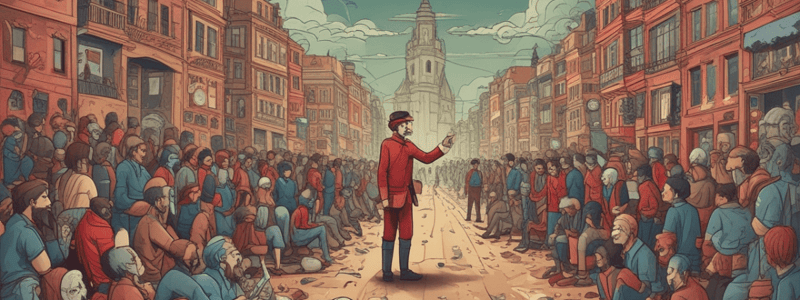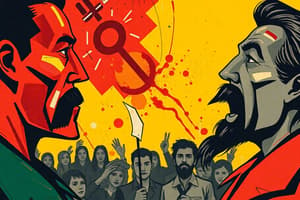Podcast
Questions and Answers
What is the existing generally accepted state of a society called?
What is the existing generally accepted state of a society called?
- Antithesis
- Reaction
- Thesis (correct)
- Synthesis
What is the outcome of the struggle between the thesis and antithesis?
What is the outcome of the struggle between the thesis and antithesis?
- A compromise or synthesis is reached (correct)
- The thesis is eliminated
- The antithesis is eliminated
- A new thesis is formed
What is the role of the middle class in the synthesis?
What is the role of the middle class in the synthesis?
- They have more power than the factory owners (correct)
- They create a new thesis
- They become the new factory owners
- They are eliminated
What can be the source of an antithesis?
What can be the source of an antithesis?
What is a limitation of conflict theory?
What is a limitation of conflict theory?
What is the primary focus of conflict theory in studying society?
What is the primary focus of conflict theory in studying society?
According to Karl Marx, what was the final stage of society that he believed would be achieved through revolution?
According to Karl Marx, what was the final stage of society that he believed would be achieved through revolution?
In a capitalist society, who held the majority of the power?
In a capitalist society, who held the majority of the power?
What was the primary way in which the proletariat made a living in a capitalist society?
What was the primary way in which the proletariat made a living in a capitalist society?
What did Marx believe would be the outcome of the economic inequality between the factory owners and the workers?
What did Marx believe would be the outcome of the economic inequality between the factory owners and the workers?
In a capitalist society, what is the primary source of tension that leads to the formation of an antithesis?
In a capitalist society, what is the primary source of tension that leads to the formation of an antithesis?
What is the result of the synthesis of the thesis and antithesis in the context of conflict theory?
What is the result of the synthesis of the thesis and antithesis in the context of conflict theory?
How does conflict theory view the role of the middle class in society?
How does conflict theory view the role of the middle class in society?
What is a key limitation of conflict theory in understanding society?
What is a key limitation of conflict theory in understanding society?
What is the primary focus of conflict theory in studying society?
What is the primary focus of conflict theory in studying society?
What is the underlying assumption of Karl Marx's model of societal change?
What is the underlying assumption of Karl Marx's model of societal change?
In a capitalist society, what is the primary way in which the bourgeoisie maintain their power?
In a capitalist society, what is the primary way in which the bourgeoisie maintain their power?
What is the term for the phenomenon where the working class becomes aware of their shared economic interests and unites against the capitalist class?
What is the term for the phenomenon where the working class becomes aware of their shared economic interests and unites against the capitalist class?
What is the role of the proletariat in a capitalist society, according to Marx?
What is the role of the proletariat in a capitalist society, according to Marx?
What is the primary focus of conflict theory in studying society, as proposed by Marx?
What is the primary focus of conflict theory in studying society, as proposed by Marx?
What is the main focus of conflict theory in studying society?
What is the main focus of conflict theory in studying society?
Who held the majority of the power in a capitalist society in 19th century Europe?
Who held the majority of the power in a capitalist society in 19th century Europe?
What is the term for the phenomenon where the working class becomes aware of their shared economic interests and unites against the capitalist class?
What is the term for the phenomenon where the working class becomes aware of their shared economic interests and unites against the capitalist class?
What is the primary way in which the proletariat made a living in a capitalist society?
What is the primary way in which the proletariat made a living in a capitalist society?
What is the underlying assumption of Karl Marx's model of societal change?
What is the underlying assumption of Karl Marx's model of societal change?
What is the primary driver of change in a society according to conflict theory?
What is the primary driver of change in a society according to conflict theory?
What is the outcome of the synthesis of the thesis and antithesis?
What is the outcome of the synthesis of the thesis and antithesis?
What is a key characteristic of the antithesis?
What is a key characteristic of the antithesis?
What is an example of a historical movement that demonstrates conflict theory?
What is an example of a historical movement that demonstrates conflict theory?
What is a limitation of conflict theory?
What is a limitation of conflict theory?
Flashcards are hidden until you start studying
Study Notes
Conflict Theory
- Focuses on the inequalities of different groups in a society
- Based on Karl Marx's ideas from the 19th century
- Marx believed society evolves through several stages: feudalism, capitalism, and finally socialism
19th Century Europe: Capitalist Society
- Rich upper class (bourgeoisie) were a minority of the population
- Poor lower class (proletariat) were the majority
- Bourgeoisie owned factories, produced goods, and sold to earn a living
- Proletariat only had their labor to sell to make a living and were dependent on factory owners
Economic Inequality
- Significant economic inequality between factory owners and workers
- Marx believed this inequality would fuel a change in society
- Workers would unite to create a class consciousness and overthrow the capitalist status quo
Marx's Model
- A society where one group exploits another economically contains the seeds of its own destruction
- The existing state (thesis) would cause the formation of a reaction (antithesis) that opposes the accepted state
- The thesis and antithesis can't exist together peacefully, leading to a compromise or synthesis of the two
Thesis, Antithesis, and Synthesis
- Example: in a capitalist society, the thesis is that the bourgeoisie run factories while the working class provides labor
- The antithesis is the desire of the working class to change the way things are
- The synthesis is the creation of a new middle class that has more power than the factory owners themselves
- The synthesis would eventually become a new thesis and begin the process again
Applications of Conflict Theory
- Examples include the struggle for African-American equal rights and the women's suffrage movement
- Each conflict between the status quo and its opposition resolves into a new thesis, waiting for the next source of tension
Limitations of Conflict Theory
- Doesn't take into account the stability that a society can experience
- Doesn't explain how a society is held together
- Doesn't like the status quo
Conflict Theory
- Focuses on the inequalities of different groups in a society
- Based on Karl Marx's ideas from the 19th century
- Marx believed society evolves through several stages: feudalism, capitalism, and finally socialism
19th Century Europe: Capitalist Society
- Rich upper class (bourgeoisie) were a minority of the population
- Poor lower class (proletariat) were the majority
- Bourgeoisie owned factories, produced goods, and sold to earn a living
- Proletariat only had their labor to sell to make a living and were dependent on factory owners
Economic Inequality
- Significant economic inequality between factory owners and workers
- Marx believed this inequality would fuel a change in society
- Workers would unite to create a class consciousness and overthrow the capitalist status quo
Marx's Model
- A society where one group exploits another economically contains the seeds of its own destruction
- The existing state (thesis) would cause the formation of a reaction (antithesis) that opposes the accepted state
- The thesis and antithesis can't exist together peacefully, leading to a compromise or synthesis of the two
Thesis, Antithesis, and Synthesis
- Example: in a capitalist society, the thesis is that the bourgeoisie run factories while the working class provides labor
- The antithesis is the desire of the working class to change the way things are
- The synthesis is the creation of a new middle class that has more power than the factory owners themselves
- The synthesis would eventually become a new thesis and begin the process again
Applications of Conflict Theory
- Examples include the struggle for African-American equal rights and the women's suffrage movement
- Each conflict between the status quo and its opposition resolves into a new thesis, waiting for the next source of tension
Limitations of Conflict Theory
- Doesn't take into account the stability that a society can experience
- Doesn't explain how a society is held together
- Doesn't like the status quo
Conflict Theory
- Focuses on the inequalities of different groups in a society
- Based on Karl Marx's ideas from the 19th century
- Marx believed society evolves through several stages: feudalism, capitalism, and finally socialism
19th Century Europe: Capitalist Society
- Rich upper class (bourgeoisie) were a minority of the population
- Poor lower class (proletariat) were the majority
- Bourgeoisie owned factories, produced goods, and sold to earn a living
- Proletariat only had their labor to sell to make a living and were dependent on factory owners
Economic Inequality
- Significant economic inequality between factory owners and workers
- Marx believed this inequality would fuel a change in society
- Workers would unite to create a class consciousness and overthrow the capitalist status quo
Marx's Model
- A society where one group exploits another economically contains the seeds of its own destruction
- The existing state (thesis) would cause the formation of a reaction (antithesis) that opposes the accepted state
- The thesis and antithesis can't exist together peacefully, leading to a compromise or synthesis of the two
Thesis, Antithesis, and Synthesis
- Example: in a capitalist society, the thesis is that the bourgeoisie run factories while the working class provides labor
- The antithesis is the desire of the working class to change the way things are
- The synthesis is the creation of a new middle class that has more power than the factory owners themselves
- The synthesis would eventually become a new thesis and begin the process again
Applications of Conflict Theory
- Examples include the struggle for African-American equal rights and the women's suffrage movement
- Each conflict between the status quo and its opposition resolves into a new thesis, waiting for the next source of tension
Limitations of Conflict Theory
- Doesn't take into account the stability that a society can experience
- Doesn't explain how a society is held together
- Doesn't like the status quo
Studying That Suits You
Use AI to generate personalized quizzes and flashcards to suit your learning preferences.




